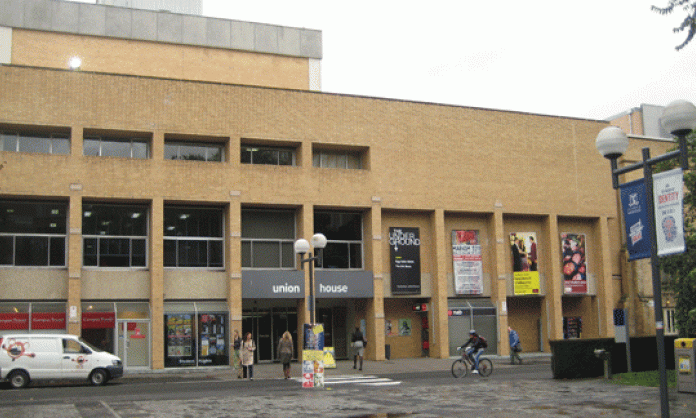“It’s such an ugly building”, says Graham Willett, describing Union House on the Parkville campus of Melbourne University. Willett, an academic, admits to no particular fondness for its blonde brick construction material and blocky design – features characteristic of the mid-century era when much of the student union building was erected. But a building is a place where things happen, he says. Measured by the things that have happened there, Union House is beautiful.
It is the locus of political activism on campus. Over decades, it has been a magnet for rebels and subversives.
It was in there, in 1964, according to Willett’s homosexual history of Melbourne University, From camp to gay, that for the first time in Melbourne “an openly homosexual person spoke publicly on behalf of gay people”. The event was a debate held in Union House’s grand buffet hall, where hundreds of students could gather.
Of “the buff”, as its usually known, Willett says, “You need those kinds of spaces where people can pack in and have those kinds of meetings.” North Court, a large courtyard bordered on three sides by the union building is the other large space where students did (and do) gather in numbers to debate the political issues of the day.
In 1972, when the Melbourne University Gay Liberation Front was affiliated to the student union as a club, Gay Liberation in Melbourne was born. Their very first meetings were held on the second floor of Union House, where student clubs still meet today. “The meetings were very big”, Willett says, “scores of people packing into the rooms”.
It wasn’t only gay rights activists who claimed a home among the radical student politics flourishing at the time. Any number of student clubs, from the left to the right, stocked distribution boxes in Union House with foolscap-sized broadsheets, produced weekly, espousing their positions on the world.
Downdraft belonged to the Melbourne University Draft Resisters, which, along with other radical left student groups in the late 1960s, declared Union House a haven for draft resisters hiding from the police. In September 1971, their declaration became more than a statement of principle. For three days and nights, four draft resisters were hidden in Union House, protected by a round-the-clock student occupation. Police eventually stormed the building, but barricades built, in part, from the garden furniture usually populating North Court, were enough to allow time for the resisters to be spirited away to safety.
Much of what makes Union House significant will never make it past the footnotes of most history books – the small stories belonging to generations of student radicals who’ve organised collectives against racism, against globalisation, for Palestine, for women’s rights; who’ve organised against the government and frequently against the university administration.
The current administration has now announced plans to “re-birth” [demolish] Union House and build apartments. Students have been told that “important synergies”, of the “co-located” and “future thinking” variety, necessitate knocking down the heart of student politics on campus.
Union House, if the university has its way, will not stand past 2018. Instead, the student union, if it’s lucky, may be offered office space in a new and corporatised student precinct that is designed to create a “more distributed model of retail”.
The current batch of student union representatives are offering tepid assurances that the “innovative solutions” being designed by the university will be better for students. Union president Rachel Withers told a recent forum, without a hint of concern: “At this stage we’ve got no idea … at this stage we don’t actually have any answers.”
Fear not, she offers uncritically, the university – which recently sacked 500 staff and is a vocal supporter of fee deregulation – is proposing to close Union House “expressly with the intention of improving the student experience”.
Upon hearing news of the university’s intentions, young Liberal spokesperson Mathew Lesh took to Facebook to cheer on the demolition job. “Can’t wait to see that building, where so much evil has taken place, torn down brick by brick”, he said.
Lesh knows the importance of Union House to left wing politics on campus. It will be a travesty if the student union hands its very home over to the university without so much as a fight.









